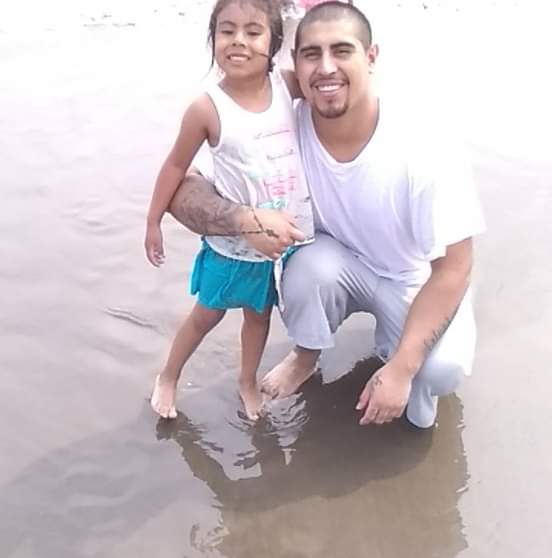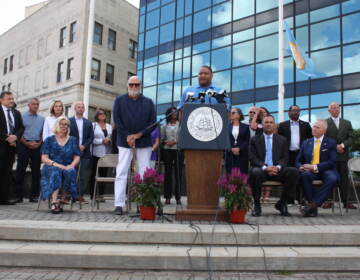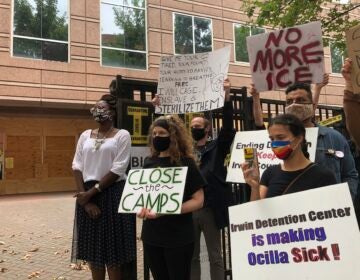Deported from Montco, dead in Mexico: ‘What [he] feared is exactly what happened’
The story illustrates the life-or-death stakes that can be inherent in immigration case law.
Listen 1:52
Cruz Eduardo Tinoco-Salvador stands with his arm around is daughter. (Provided by attorney Christopher Casazza)
Cruz Eduardo Tinoco Salvador was an obvious target for immigration officials. On his left hand, a tattoo read “Sur 13.” On his middle finger, three small dots indicated the same affiliation.
“Subject is a high-ranking member of the Sureno 13 street gang,” reads a Department of Homeland Security report after officials arrested him near his Montgomery County home.
His family and attorney say those markings made him another sort of target, evidence that he would become the victim, not the perpetrator, of organized crime.
Upon arrest, Tinoco Salvador applied for withholding of removal, similar to asylum, fearing retribution if sent back to Mexico.
His appeal was denied, and last month — one year after his deportation — Tinoco Salvador, 22, was found dead in a small town in central Mexico, shot in the head with his hands tied behind his back.
For his family members, the story illustrates the life-or-death stakes that can be inherent in immigation case law.
‘Leave all that behind’
During the early hours of June 20, 2017, law enforcement descended on their targets. Federal officers from U.S. Immigration and Customs Enforcement, along with local police from Norristown and Bridgeport, watched three men, including Tinoco Salvador, get out of a grey Toyota and then arrested them on immigration violations.
At immigration detention in the York County Prison, Tinoco Salvador applied for withholding of removal, a kind of reprieve from deportation offered to immigrants who can demonstrate they are more likely than not to be persecuted in their home countries.
In a sworn affidavit, he said the gang Sur-13 recruited him in February 2012, when he was 14-years-old and living in Mexico. Part of the initiation was a beating, he said.
“They told me that if I tried to leave they would kill me. I knew this was true. Once you join South [Sur] 13, you cannot leave. These are the rules,” he testified.
Records show he tried to flee the country two months later, but was turned around at the border in April 2012. He returned to his hometown, and began selling marijuana for the gang.
In 2014, he and his girlfriend had a daughter.
“Once my daughter was born, my whole world changed,” he said in the affidavit. “I didn’t want to be in the gang anymore, and I wanted to leave that all behind. I wanted to spend more time with my daughter and [be] with my wife.” Tinoco Salvador said he tried to step back from the gang to be with his daughter, but that the leader put a gun to his head and threatened to kill him if he stopped selling marijuana.
The next year, he tried to leave again. After three failed attempts, he crossed the U.S.-Mexico border without detection He joined family already living in Norristown and began working as a landscaper, then a roofer.
His daughter and partner stayed in Mexico. Tinoco Salvador testified that he believed they would be safe there.
After his arrest by ICE, he argued that he would be unsafe in Mexico. Police would suspect him of being a criminal and not protect him, while his former gang members or rival gangs would be able to pick him out easily.
“My tattoos give me away,” said Tinoco Salvador.
Expert testimony in the case from Col. Robert O. Kirkland, a retired U.S. Army officer and university professor specializing in Mexican and Latin America, affirmed his fears.
“It is difficult, if not impossible, for a returning deportee to escape notice,” he said.
In his decision, York County Immigration Judge John Ellington wrote that while Tinoco Salvador’s fears were credible, he’d failed to show that the Mexican police would turn a blind eye if Sur-13 threatened him, and ordered him removed from the country.
‘What Cruz had feared’
During both the Obama and Trump Administrations, immigration officials have highlighted enforcement against criminals and gang members. At the same time, decisions by the Bureau of Immigration Appeals and former Attorney General Jeff Sessions narrowed the grounds for former gang members to access humanitarian protections.
Undocumented immigrants with any ties to gangs have fueled calls for greater restrictions on lawful immigration programs such as asylum.
On the enforcement side, U.S. Immigration and Customs Enforcement arrested more than 10,000 “known or suspected” gang members in fiscal year 2018, according to the government’s own estimates.
Last year, the U.S. House of Representatives passed the Criminal Alien Gang Member Removal Act, with some bipartisan support. It would bar people associated with designated gangs from being granted asylum and some other forms of protection from deportation.
U.S. Rep. Brian Fitzpatrick, representing Pennsylvania’s 1st Congressional District centered in Bucks County, one of the bill’s cosponsors, said penalties needed to be strengthened for suspected gang members who may otherwise engage in criminal activity in the U.S.
“This is something that the Department of Homeland Security asked us to do,” he said.
Groups such as the American Civil Liberties Union have argued that broadening law enforcement language to target gangs can result in racial profiling, and has sued for more information about how gang suppression stings are carried out.
At the same time, gang violence is one factor driving migration from Central America and some parts of Mexico, where young men may be fleeing not only threats but also conscription.
“They’re often recruited as children,” said Jaya Ramji-Nogales, a Temple University law professor who specializes in refugee and asylum law. “They don’t have another choice.”
While not impossible, withholding of removal or asylum cases based on gang involvement can be difficult to win because judges may rule based on fears about potential criminality, rather than weighing the total set of circumstances facing former gang members, said Ramji-Nogales.
Recent decisions by the Board of Immigration Appeals, and former Attorney General Jeff Sessions, have also sought to narrow the grounds for who can get legal status based on persecution. In 2018, Sessions attempted to exclude victims of domestic violence and criminal activity by gangs from qualifying for asylum, but a federal judge later struck down parts of that decision.
After he was deported, Tinoco Salvador returned to the area where he grew up, and reconnected with his daughter and her mother. His family declined to talk on the record about what his life was like there after deportation.
Tinoco Salvador’s U.S. immigration attorney, Christopher Casazza said he learned of his former client’s death when family members visited him earlier this month. They brought his death certificate and believe it’s clear the gang is responsible.
Tinoco Salvador’s daughter and partner are now in hiding.
“What Cruz had feared,” said Casazza, “is exactly what happened to him.”
WHYY is your source for fact-based, in-depth journalism and information. As a nonprofit organization, we rely on financial support from readers like you. Please give today.





